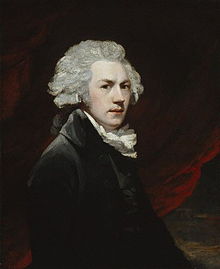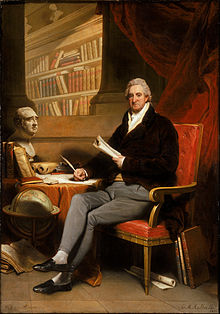Martin Archer Shee
Martin Archer Shee | |
|---|---|
 Self-portrait (1794) | |
| President of the Royal Academy | |
| In office January 1830 – 13 August 1850 | |
| Preceded by | Sir Thomas Lawrence |
| Succeeded by | Sir Charles Lock Eastlake |
| Personal details | |
| Born | 23 December 1769 Dublin, Ireland |
| Died | 13 August 1850 (aged 80) Brighton, Sussex, England |
| Known for | Portraiture |
Sir Martin Archer Shee PRA FRS (23 December 1769 – 13 August 1850) was an Irish portrait painter. He also served as the president of the Royal Academy.
Early life
He was born in Dublin, of an old Irish Roman Catholic family, the son of Martin Shee, a merchant, who regarded the profession of a painter as an unsuitable occupation for a descendant of the Shees. His son Martin nevertheless studied art in the Royal Dublin Society and came to London. There, in 1788, he was introduced by Edmund Burke[1] to Joshua Reynolds, on whose advice he studied in the schools of the Royal Academy of Arts.
Career
In 1789, he exhibited his first two pictures, the "Head of an Old Man" and "Portrait of a Gentleman." Over the next ten years he steadily increased in practice. He was chosen an associate of the Royal Academy in 1798.
In 1789, he married Mary, eldest daughter of James Power of Youghal, and in 1800 he was elected a Royal Academician. He moved to George Romney's former house at 32 Cavendish Square, and set up as his successor. In addition to his portraits he executed various subjects and historical works, such as Lavinia, Belisarius, his diploma picture "Prospero and Miranda", and the "Daughter of Jephthah".[citation needed]
Writing





In 1805 he published a poem consisting of Rhymes on Art, and a second part followed in 1809. Lord Byron spoke well of it in his English Bards and Scotch Reviewers. Shee published another small volume of verse in 1814, entitled The Commemoration of Sir Joshua Reynolds, and other Poems, but this was less successful. He also produced a tragedy, Alasco, set in Poland. The play was accepted at Covent Garden, but was refused a licence, on the grounds that it contained treasonable allusions, and Shee angrily resolved to make his appeal to the public. He carried out his threat in 1824, but Alasco was still on the list of unacted dramas in 1911. He also published two novels – Oldcourt (1829, in three volumes) and Cecil Hyde (1834).[citation needed]
On the death of Sir Thomas Lawrence in 1830, Shee was chosen president of the Royal Academy in his stead and shortly afterwards received a knighthood. In 1831, he was elected a Fellow of the Royal Society. [citation needed]
In an examination before the parliamentary committee of 1836 concerning the functions of the Royal Academy, he ably defended its rights. He continued to paint till 1845, when illness made him retire to Brighton. He was deputised for at the Academy by J. M. W. Turner, who had appointed him a trustee of the projected Turner almshouse. From 1842 to 1849, he was the first president of the Birmingham Society of Artists.[2]
Death
Shee died in Brighton in 1850 and was buried in the western extension to St Nicholas' Churchyard in Brighton. His headstone remains, but has been laid flat and moved to the perimeter of the site.[3]
Personal life
Shee had three sons, who became successful barristers, and three daughters.
Descendants of one of the sons was George Archer-Shee, whose story inspired The Winslow Boy, a play written by Sir Terence Rattigan and his older half-brother, Martin Archer-Shee MP.
Shee's descendant, Mary Archer-Shee, supports the campaign for the fulfilment of Turner's wishes for his bequests.
Written works by Shee (selected)
- Elements of art, a poem; in six cantos (1809)
- Rhymes on Art; Or, The Remonstrance of a Painter: in Two Parts (1809)
- The Commemoration of Reynolds: In Two Parts (1814)
- Oldcourt: Volume 1, Volume 2, Volume 3 (London : H. Colburn, 1829)
- Alasco: A Tragedy, in Five Acts (Sherwood, Jones, and co., 1824).
Bibliography
- Martin Archer Shee, The Life of Sir Martin Archer Shee, Volume 1, Volume 2 (London: Longman, Green, Longman, and Roberts, 1860).[4]
Notes
- ^ THE EUROPEAN MAGAZINE, AND LONDON REVIEW: ILLUSTRATIVE OF THE LITERATURE, HISTORY, BIOGEAPHY, POLITICS, ART, MANNERS, AND AMUSEMENTS OF THE AGE.
- ^ Anon (1933). "The Spring Exhibition, 1933 (catalogue)". RBSA.
{{cite journal}}: Cite journal requires|journal=(help) - ^ Dale, Antony (1991). Brighton Cemeteries. Brighton: Brighton Borough Council. p. 8.
- ^ "Review of The Life of Sir Martin Archer Shee, President of the Royal Academy by his son, Martin Archer Shee, of the Inner Temple, Esq. Barrister-at-Law, 2 vols". The Athenaeum (1700): 711–713. 26 May 1860.
References
- Chisholm, Hugh, ed. (1911). . Encyclopædia Britannica (11th ed.). Cambridge University Press.
External links
- 86 artworks by or after Martin Archer Shee at the Art UK site
- Sir Martin Archer Shee online (ArtCyclopedia)
- Biography of M. A. Shee (Encyclopedia of Irish and World Art)
- William Archer Shee, the artist's son (Oil on canvas, Ca. 1820 – Metropolitan Museum of Art)
- Portrait by Thomas Bridgford
- 1769 births
- 1850 deaths
- Artists from County Dublin
- 18th-century Irish painters
- 19th-century Irish painters
- Irish male painters
- Irish portrait painters
- Royal Academicians
- Knights Bachelor
- Irish emigrants to Kingdom of Great Britain
- 19th-century Irish poets
- 19th-century Irish novelists
- 19th-century Irish dramatists and playwrights
- Irish male dramatists and playwrights
- Fellows of the Royal Society
- Members and Associates of the Royal Birmingham Society of Artists
- Irish male novelists
- Irish male poets
- 19th-century Irish male artists
- Committee members of the Society for the Diffusion of Useful Knowledge
